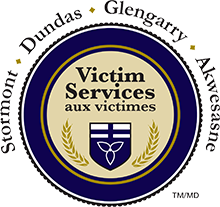Victim Services of S.D.G. & A. is a non-profit organization dedicated to providing assistance to individuals who have been victimized as a result of a crime or tragic circumstance. Our agency works in partnership with police as well as emergency and other community based services to ensure victims receive the help they need to assist them in the development of their personal path to recovery. Funding for this Program is provided by the Government of Ontario. The views expressed in the publication are the views of the Recipient and do not necessarily reflect those of the Province.
ContactPost Traumatic Stress Disorder (PTSD) can be developed after experiencing a shocking, scary, or dangerous event. It is natural to feel afraid during and after a traumatic situation. Fear is a part of the body’s normal “fight-or-flight” response that helps us avoid or respond to potential danger. People may experience a range of reactions after trauma, and most will recover from their symptoms over time. Those who continue to experience symptoms may be diagnosed with PTSD.
Anyone can develop PTSD at any age. This includes combat veterans as well as people who have experienced or witnessed a physical or sexual assault, abuse, an accident, a disaster, a terror attack, or other serious events. People who have PTSD may feel stressed or frightened, even when they are no longer in danger. Not everyone with PTSD has been through a dangerous event. In some cases, learning that a relative or close friend experienced trauma can cause PTSD.
Symptoms of PTSD usually begin within 3 months of the traumatic incident, but they sometimes emerge later.
Re-experiencing symptoms
Thoughts and feelings can trigger these symptoms, as can words, objects, or situations that are reminders of the event.
Avoidance symptoms
Avoidance symptoms may cause people to change their routines. For example, after a serious car accident, a person may avoid driving or riding in a car.
Arousal and reactivity symptoms
Arousal symptoms are often present—they can lead to feelings of stress and anger and may interfere with parts of daily life, such as sleeping, eating, or concentrating.
Cognition and mood symptoms
Cognition and mood symptoms can begin or worsen after the traumatic event and can lead a person to feel detached from friends or family members.
Not everyone who lives through a dangerous event develops PTSD—many factors play a part. Some of these factors are present before the trauma; others become important during and after a traumatic event.
Risk factors that may increase the likelihood of developing of PTSD include:
Resilience factors that may reduce the likelihood of developing PTSD include:
